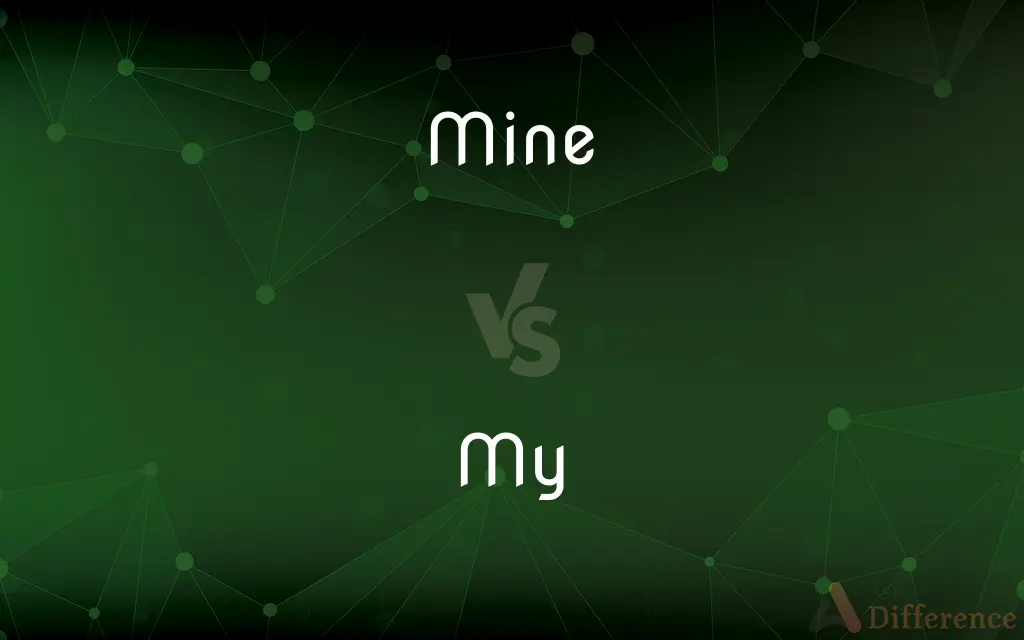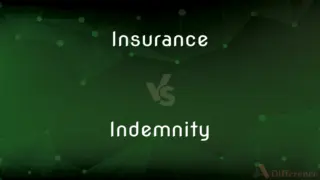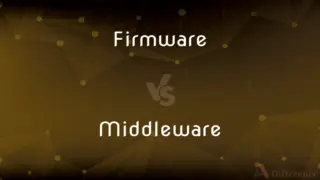Mine vs. My — What's the Difference?
Edited by Tayyaba Rehman — By Urooj Arif — Updated on March 14, 2024
"Mine" is a possessive pronoun used to denote ownership or relation without the need for an accompanying noun, while "my" is a possessive adjective that precedes and modifies a noun, indicating ownership or association.

Difference Between Mine and My
Table of Contents
ADVERTISEMENT
Key Differences
"Mine" is used when the ownership or association is implied without directly naming the object. It serves as a standalone term, replacing a noun phrase altogether. For example, in the sentence "This book is mine," "mine" directly indicates ownership of the book without repeating the word "book." On the other hand, "my" requires a noun to follow it, as it modifies the noun to denote possession. For instance, in "My book is on the table," "my" modifies "book" to indicate that the speaker owns or is associated with the book.
The use of "mine" is common in responses or statements where the noun in question is already understood from the context, eliminating the need to repeat the noun. "My," however, is used to introduce the noun in question, making it clear what the speaker is referring to. This difference highlights the distinct grammatical roles they play in sentence construction, with "mine" replacing a noun and "my" modifying it.
While "mine" can stand alone as a response to indicate possession, as in "Whose is this?" with the reply "It's mine," "my" cannot be used in this way. "My" always precedes a noun or noun phrase, such as "my car" or "my opinion," specifying what is being possessed or related to the speaker.
In terms of emotional or stylistic connotations, "mine" can sometimes emphasize a stronger or more personal sense of possession or connection, given its standalone nature. "My," being more commonly used and straightforward in modifying a noun, might not carry the same weight of emphasis in everyday use.
Both "mine" and "my" are integral to expressing possession or association in English, but their usage is determined by whether the noun is implied and understood or needs to be explicitly stated and modified.
ADVERTISEMENT
Comparison Chart
Part of Speech
Possessive Pronoun
Possessive Adjective
Usage
Stands alone, replacing a noun
Precedes and modifies a noun
Example
"This is mine."
"This is my book."
Requirement
No accompanying noun
Requires an accompanying noun
Contextual Use
Used when the object is understood
Used to introduce the object
Compare with Definitions
Mine
Denotes ownership without naming the object.
The last piece of pizza is mine.
My
Always precedes a noun.
My family is very supportive.
Mine
Used in responses or claims.
Whose idea was this? It was mine.
My
Common in everyday language.
I lost my keys again.
Mine
Stands in for a noun phrase.
Is this your coat? No, mine is at home.
My
Specifies the object in question.
My opinion differs from yours.
Mine
Functions independently.
Choose any book. Which one? The one that's mine.
My
Lacks standalone usage.
I can't find my ticket.
Mine
Can emphasize personal attachment.
I have many memories here. this place is mine.
My
Modifies a noun to denote possession.
My phone is missing.
Mine
A hole or tunnel dug into the earth from which ore or minerals are extracted.
My
Used as a modifier before a noun
My boots.
My accomplishments.
Mine
A surface excavation where the topmost or exposed layer of earth is removed for extracting its ore or minerals.
My
Used preceding various forms of polite, affectionate, or familiar address
My friend, you are so right.
Mine
The site of such a hole, tunnel, or excavation, including its surface buildings and equipment.
My
Used in various interjectional phrases
My word! My goodness!.
Mine
A deposit of ore or minerals in the earth or on its surface.
My
Used as an exclamation of surprise, pleasure, or dismay
Oh, my! What a tiring day!.
Mine
An abundant supply or source of something valuable
This guidebook is a mine of information.
My
First-person singular possessive determiner. See Appendix:Possessive#English.
Mine
A tunnel dug under an enemy emplacement to destroy it by explosives, cause it to collapse, or gain access to it for an attack.
My
Belonging to me.
I can't find my book.
Mine
An explosive device used to destroy enemy personnel, shipping, fortifications, or equipment, often placed in a concealed position and designed to be detonated by contact, proximity, or a time fuse.
My
Associated with me.
My seat at the restaurant was uncomfortable.
Don't you know my name?
I recognised him because he had attended my school.
Mine
A burrow or tunnel made by an insect, especially one made in a leaf by a leaf miner.
My
Related to me.
My parents won't let me go out tonight.
Mine
To extract (ore or minerals) from the earth.
My
In the possession of me.
I have to take my books back to the library soon.
Mine
To dig a mine in (the earth) to obtain ore or minerals.
My
Used to express surprise, shock or amazement.
My, what big teeth you have!
Mine
To tunnel under (the earth or a surface feature).
My
Of or belonging to me; - used always attributively; as, my body; my book; - mine is used in the predicate; as, the book is mine. See Mine.
Mine
To make (a tunnel) by digging.
Mine
To lay explosive mines in or under.
Mine
To attack, damage, or destroy by underhand means; subvert.
Mine
To delve into and make use of; exploit
Mine the archives for detailed information.
Mine
To excavate the earth for the purpose of extracting ore or minerals.
Mine
To work in a mine.
Mine
To dig a tunnel under the earth, especially under an enemy emplacement or fortification.
Mine
To lay explosive mines.
Mine
Used instead of my before an initial vowel or the letter h.
Mine
That which belongs to me.
Mine
Used predicatively.
The house itself is mine, but the land is not.
Mine
Used substantively, with an implied noun.
Mine has been a long journey.
Mine
Used absolutely, set off from the sentence.
Mine for only a week so far, it already feels like an old friend.
Mine
Used otherwise not directly before the possessed noun. en
Mine
My; belonging to me.
Mine
(archaic) Used attributively after the noun it modifies.
Mine
(archaic) Used attributively before a vowel.
Mine
An excavation from which ore or solid minerals are taken, especially one consisting of underground tunnels.
This diamond comes from a mine in South Africa.
He came out of the coal mine with a face covered in black.
Most coal and ore comes from open-pit mines nowadays.
Mine
(figurative) Any source of wealth or resources.
She's a mine of information.
Mine
(military) A passage dug toward or underneath enemy lines, which is then packed with explosives.
Mine
(military) A device intended to explode when stepped upon or touched, or when approached by a ship, vehicle, or person.
His left leg was blown off after he stepped on a mine.
The warship was destroyed by floating mines.
Mine
(pyrotechnics) A type of firework that explodes on the ground, shooting sparks upward.
Mine
(entomology) The cavity made by a caterpillar while feeding inside a leaf.
Mine
(computing) A machine or network of machines used to extract units of a cryptocurrency.
Mine
Alternative form of mien
Mine
(ambitransitive) To remove (rock or ore) from the ground.
Mine
To dig into, for ore or metal.
Mine
(transitive) To sow mines (the explosive devices) in (an area).
We had to slow our advance after the enemy mined the road ahead of us.
Mine
(transitive) To damage (a vehicle or ship) with a mine (an explosive device).
Mine
(intransitive) To dig a tunnel or hole; to burrow in the earth.
The mining cony
Mine
To dig away, or otherwise remove, the substratum or foundation of; to lay a mine under; to sap; to undermine.
Mine
To ruin or destroy by slow degrees or secret means.
Mine
(slang) To pick one's nose.
Mine
(cryptocurrencies) To earn new units of cryptocurrency by doing certain calculations.
Mine
See Mien.
Mine
A subterranean cavity or passage
Mine
Any place where ore, metals, or precious stones are got by digging or washing the soil; as, a placer mine.
Mine
A rich source of wealth or other good.
Mine
An explosive device placed concealed in a location, on land or at sea, where an enemy vehicle or enemy personnel may pass through, having a triggering mechanism which detects people or vehicles, and which will explode and kill or maim personnel or destroy or damage vehicles. A mine placed at sea (formerly called a torpedo, see torpedo{2} (a)) is also called an marine mine and underwater mine and sometimes called a floating mine, even though it may be anchored to the floor of the sea and not actually float freely. A mine placed on land (formerly called a torpedo, see torpedo{3}), usually buried, is called a land mine.
Mine
Belonging to me; my. Used as a pronominal to me; my. Used as a pronominal adjective in the predicate; as, "Vengeance is mine; I will repay." Rom. xii. 19. Also, in the old style, used attributively, instead of my, before a noun beginning with a vowel.
I kept myself from mine iniquity.
When a man deceives me once, says the Italian proverb, it is his fault; when twice, it is mine.
This title honors me and mine.
She shall have me and mine.
Mine
To dig a mine or pit in the earth; to get ore, metals, coal, or precious stones, out of the earth; to dig in the earth for minerals; to dig a passage or cavity under anything in order to overthrow it by explosives or otherwise.
Mine
To form subterraneous tunnel or hole; to form a burrow or lodge in the earth; as, the mining cony.
Mine
To dig away, or otherwise remove, the substratum or foundation of; to lay a mine under; to sap; to undermine; hence, to ruin or destroy by slow degrees or secret means.
They mined the walls.
Too lazy to cut down these immense trees, the spoilers . . . had mined them, and placed a quantity of gunpowder in the cavity.
Mine
To dig into, for ore or metal.
Lead veins have been traced . . . but they have not been mined.
Mine
To get, as metals, out of the earth by digging.
The principal ore mined there is the bituminous cinnabar.
Mine
Excavation in the earth from which ores and minerals are extracted
Mine
Explosive device that explodes on contact; designed to destroy vehicles or ships or to kill or maim personnel
Mine
Get from the earth by excavation;
Mine ores and metals
Mine
Lay mines;
The Vietnamese mined Cambodia
Common Curiosities
What is the main difference between "mine" and "my"?
"Mine" is a possessive pronoun used without a noun, while "my" is a possessive adjective that must modify a noun.
Can "mine" be used in place of "my" in any context?
No, "mine" cannot replace "my" because it cannot precede a noun. It's used when the noun is omitted due to being understood from the context.
Are there any exceptions to the rule of using "my" before a noun?
Generally, "my" should always precede a noun or noun phrase. However, in poetic or archaic language, you might find "my" used in ways that don't follow modern grammatical rules, but these are exceptions rather than the norm.
Can "my" stand alone in a sentence?
No, "my" cannot stand alone; it must be followed by a noun to indicate what is being possessed or related to.
Can "mine" and "my" be used interchangeably in the same sentence?
No, "mine" and "my" cannot be used interchangeably in the same sentence because they serve different grammatical functions. "Mine" replaces a noun, while "my" needs to modify a specified noun.
How do I know when to use "mine" instead of "my"?
Use "mine" when the noun is not mentioned because it's already clear from the conversation. Use "my" when you need to specify the noun you're referring to.
In a sentence like "This book is my favorite," can I say "This book is mine favorite"?
No, "This book is mine favorite" is incorrect because "mine" cannot modify a noun directly like "my" can. The correct form would be "This book is my favorite" or simply "This book is mine" if the context makes it clear that you're discussing favorites.
Is there a difference in emphasis between "mine" and "my"?
"Mine" might convey a stronger sense of possession or personal attachment in some contexts, given its standalone usage, while "my" is more straightforward and common.
How does the use of "mine" affect the tone of a sentence compared to "my"?
The use of "mine" can sometimes add a more personal or emphatic tone to a sentence because it highlights the speaker's direct claim to the object or concept, especially when the possession is a point of pride, contention, or deep personal value.
How can non-native speakers practice distinguishing between "mine" and "my"?
Non-native speakers can practice by creating sentences where they express ownership or relation to various objects, ensuring they use "my" when directly modifying a noun and "mine" when the noun is implied and not directly stated. Reading and listening to English content can also help reinforce the correct usage through examples.
Share Your Discovery

Previous Comparison
Insurance vs. Indemnity
Next Comparison
Firmware vs. MiddlewareAuthor Spotlight
Written by
Urooj ArifUrooj is a skilled content writer at Ask Difference, known for her exceptional ability to simplify complex topics into engaging and informative content. With a passion for research and a flair for clear, concise writing, she consistently delivers articles that resonate with our diverse audience.
Edited by
Tayyaba RehmanTayyaba Rehman is a distinguished writer, currently serving as a primary contributor to askdifference.com. As a researcher in semantics and etymology, Tayyaba's passion for the complexity of languages and their distinctions has found a perfect home on the platform. Tayyaba delves into the intricacies of language, distinguishing between commonly confused words and phrases, thereby providing clarity for readers worldwide.














































